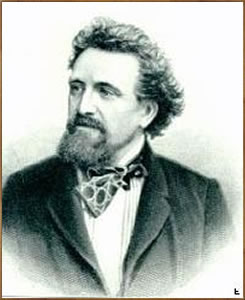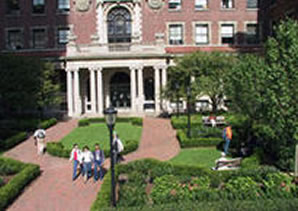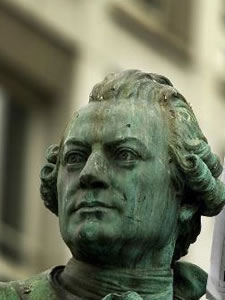De Duitse schrijver Wilhelm Genazino werd geboren op 22 januari 1943 in Mannheim. Zie ook mijn blog van 22 januari 2007 en ook mijn blog van 22 januari 2008.
Uit: Mittelmäßiges Heimweh
Die Stadt ist fast leer. Die meisten Leute sind in Urlaub oder sitzen in Gartenlokalen. Die Hitze drückt auf die Dächer. Ich könnte in mein Apartment gehen, aber dort ist es genauso warm wie draußen. Gestern abend bin ich so lange in der Stadt umherge laufen, bis ich durch die Müdigkeit ganz leicht geworden war. Schließlich habe ich mich auf eine Bank gesetzt und bin dort sogar eingeschlafen. Grölende Jugendliche haben mich zwanzig Minuten später geweckt, das war unangenehm. Es ist nicht einfach, ein einzelner zu sein. Ein Halbschuh liegt auf der Straße, die Sohle nach oben. Aus einer Seitenstraße kommt das Geräusch eines Autos, das über eine Plastikflasche fährt. Es überholt mich ein Angestellter mit einem über der Schulter hängenden Koffer. Der Koffer zieht so stark nach unten, daß der Trageriemen den Rückenteil des Anzugs nach unten zieht und den Mann wie ein gehendes Unglück aussehen läßt. Ich ekle mich ein bißchen über die tief nach unten hängenden Unterlippen einiger vorüberkeuchender Jogger. Die Türen vieler Lokale sind weit offen. In manches Lokal trete ich kurz ein und kehre rasch wieder um. In Kürze werde ich dazu keine Lust mehr haben und mich einfach irgendwo auf einen Stuhl setzen und ein Glas Bier bestellen. Ich biege in die Wormser Straße ein und sehe in einiger Entfernung das Sportlereck. In diesem Lokal bin ich in der vorigen Woche zweimal gewesen. Der Wirt hob schon beim zweiten Mal wohlwollend die Hand, als er mich wiedererkannte. Die Tür und die Fenster des Pils-Stübchens sind ebenfalls weit geöffnet, der Lärm der Besucher dringt auf die Straße und vermischt sich mit dem Lärm anderer Wirtschaften. Seit etwa einer Woche werden im Fernsehen die Spiele der Fußball-Europameisterschaft übertragen. In den meisten Lokalen sind die Fernsehapparate eingeschaltet. Meine Schritte führen mich halbautomatisch in die offene Tür des Sportlerecks hinein, obwohl ich mich nicht für Fußball interessiere.”

Wilhelm Genazino (Mannheim, 22 januari 1943)
De Engelse dichter en schrijver George Gordon Byron (beter bekend als Lord Byron) werd geboren op 22 januari 1788 in Londen. Zie ook mijn blog van 22 januari 2007 en mijn blog van 19 april 2006 en ook mijn blog van 22 januari 2008.
On this day I complete my thirty-sixth year
‘IS time the heart should be unmoved,
Since others it hath ceased to move:
Yet, though I cannot be beloved,
Still let me love!
My days are in the yellow leaf;
The flowers and fruits of love are gone;
The worm, the canker, and the grief
Are mine alone!
The fire that on my bosom preys
Is lone as some volcanic isle;
No torch is kindled at its blaze–
A funeral pile.
The hope, the fear, the jealous care,
The exalted portion of the pain
And power of love, I cannot share,
But wear the chain.
But ’tis not thus–and ’tis not here–
Such thoughts should shake my soul nor now,
Where glory decks the hero’s bier,
Or binds his brow.
The sword, the banner, and the field,
Glory and Greece, around me see!
The Spartan, borne upon his shield,
Was not more free.
Awake! (not Greece–she is awake!)
Awake, my spirit! Think through whom
Thy life-blood tracks its parent lake,
And then strike home!
Tread those reviving passions down,
Unworthy manhood!–unto thee
Indifferent should the smile or frown
Of beauty be.
If thou regrett’st thy youth, why live?
The land of honourable death
Is here:–up to the field, and give
Away thy breath!
Seek out–less often sought than found–
A soldier’s grave, for thee the best;
Then look around, and choose thy ground,
And take thy rest.
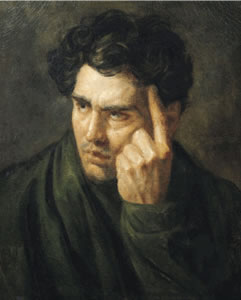
Lord Byron (22 januari 1788 – 19 april 1824)
Portret door Théodore Géricault
De Poolse dichter Krzysztof Kamil Baczyński werd op 22 januari 1921 in Warschau geboren. Zie ook mijn blog van 22 januari 2007 en ook mijn blog van 22 januari 2008.
*Elegy on . . . (a Polish boy)
They kept you, little son, from dreams like trembling butterflies,
they wove you, little son, in dark red blood two mournful eyes,
they painted landscapes with the yellow stitch of conflagrations,
they decorated all with hangmen’s trees the flowing oceans.
They taught you, little son, to know by heart your land of birth
as you were carving out with tears of iron its many paths.
They reared you in the darkness and fed you on terror’s bread;
you traveled gropingly that shamefulest of human roads.
And then you left, my lovely son, with your black gun at midnight,
and felt the evil prickling in the
sound of each new minute.
Before you fell, over the land you raised your hand in blessing.
Was it a bullet killed you, son, or was it your heart bursting?
Vertaald door Bill Johnston
Tropical dream
In this dream mosquitos bit through a tropical helmet
and wave on wave into the skull pours the night.
Raise up, raise up the palm’s black leaves,
he sky blood-red from heat – a copper-yellow roof!
Crocodiles – elongated slabs of lead,
like lead thump the hoofs of anxious antelopes.
Where flows the river like a word unbounded,
on to seacoasts, antilles, sudans?
Waters burble, stagnate, below there is no room for breath.
Negroes dry out, propped on idols, ill with sleep,
heaving their slabs of air, washed by water like death.
Along white shores trundle the pale grains of leprosy.
Then weary hands will fast upend the drawer –
from it a waft of fever blows
and seething bubbles flow on hands.
Ever lower sinks the smoke of stifling marshes
and one hears: off lifeless Negroes fall white ashes.
Vertaald door Alex Kurczaba
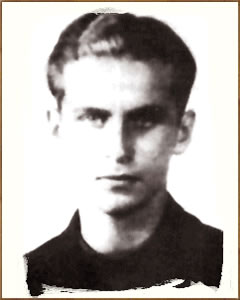
Krzysztof Kamil Baczyński (22 januari 1921 – 4 augustus 1944)
De Belgische dichter en schrijver Herwig Hensen werd geboren op 22 januari 1917 in Antwerpen. Zie ook mijn blog van 22 januari 2007 en ook mijn blog van 22 januari 2008.
Deze aarde , wij hebben ze opgebruikt
Deze aarde , wij hebben ze opgebruikt:
grond, wateren, beemden, bomen,
de vrucht die smaakt, de bloem die ruikt,
en ’t land waarvan wij dromen.
Wat geven wij onze kinderen mee
behalve spreuken en kogels?:
niet eens het zuivere zout van de zee
en ’t zingen van de vogels.
Maar wél het gif en het haastige kruid,
en haat die alom kan passen.
Sindsdien doven de lentes uit
en dorren vroeg de grassen.
Belofte slaat over in ongeduld
voor wie geen hoop meer bewaren.
Wat zijn wij onder zoveel schuld?:
bedriegers of barbaren?
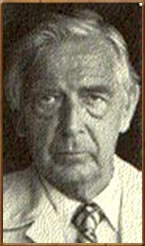
Herwig Hensen (22 januari 1917 – 24 mei 1989)
De Zwitserse dichter en schrijver Rainer Brambach werd geboren op 22 januari 1917 in Basel. Zie ook mijn blog van 22 januari 2007 en ook mijn blog van 22 januari 2008.
Brief an Hans Bender
Für uns die Konturen,
die Akzente.
Für uns das Tabaksfeld mannshoch
und der Weinberg im Badischen Land.
Für uns die Silberpappel am Rhein,
der Vogelschwarm unter den Wolken,
und von mir aus alles,
was über den Wolken ist.
Für dich der Tisch, das Papier
und die verläßliche Feder –
Für mich die Axt,
ich mag Trauerweiden nicht.
Was sind das für Bäume,
die zu Boden zeigen, Hans,
seit Straßburg neben mir unterwegs
auf dieser Erde.
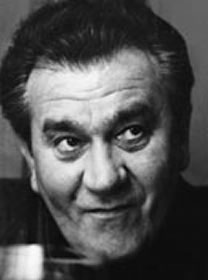
Rainer Brambach (22 januari 1917 – 14 augustus 1983)
De Oostenrijkse dichteres en schrijfster Ingrid Puganigg werd op 22 januari 1947 geboren in Gassen bij Afritz am See, Kärnten. Zie ook mijn blog van 22 januari 2007.
Uit: Hochzeit
„Nichts blieb hinzuzufügen, alles war deutlidi sichtbar bis in die fernste Zukunft, als wäre ihr Leben bereits gelebt. Sie konnte ihn und dieses Haus verlassen, jetzt sofort, es war gleichgültig, wohin sie ginge, ankommen würde sie nie. Sie würde in Nächten auf fremden Betten von engen Alpentälem träumen, auf der Flucht sein vcr Menschen, die in einer fremden Sprache redeten, und tagsüber würde sie sich nach ihnen sehnen und sie beschreiben, Seiten mit ihnen füllen und sich nach ihrem fernen Leben verzehren, so daß sie darüber ihr eigenes vergaß. Dann würde sie vielleicht die Tage zählen, bis ihre Kinder sie besuchten oder bis sie zu ihnen fliegen durfte.”

Ingrid Puganigg (Gassen, 22 januari 1947)
De Franse kunstschilder, dichter en schrijver Francis Picabia werd geboren in Parijs op 22 januari 1879. Picabia was nauwelijks 15 jaar oud, toen zijn vader zijn eerste doek, Une rue aux Martigues, instuurde naar de Parijse Salon des Artistes Français. In 1897 ontdekte hij het Impressionisme van Alfred Sisley en in 1898 werd zijn enthousiasme nog groter, toen hij kennismaakte met de familie Camille Pissarro. Het werd het begin van een uitbundig vruchtbare werkperiode, die 10 jaar lang zou aanhouden. Een eerste expositie, in 1905, in de Galerie Haussmann was meteen een triomf. Van januari tot mei 1913 verbleef Picabia in New York als woordvoerder van de groep op de bekende Armory Show. Toen WO I uitbrak, werd de te Parijs gemobiliseerde Picabia, in 1915, naar Cuba op missie gestuurd. Het jaar daarop vond hij Marcel Duchamp en zijn vroegere vrienden terug en
werd hij betrokken bij de uitgave van een avant-garde tijdschrift 291. Een tijdlang legde hij zelfs het penseel opzij en publiceerde hij de eerste van zijn Cinquante-Deux Miroirs te Barcelona, in 1917. In maart 1917 ging hij terug naar New York, nu voor een half jaar, en bracht daar zijn nu 391 geworden tijdschrift opnieuwe uit. Alweer met Marcel Duchamp nam hij er deel aan de eerste Exposition des Indépendants. 391 was aan zijn 14de nummer toe, toen Picabia zich van Dada verwijderde, in mei 1921. In juli van dat jaar publiceerde hij het nummer Pilhaou-Thibaou, dat een regelrecht anti-Dada-manifest werd. Terzelfdertijd benaderde hij André Breton, de paus van het Surrealisme.
Eau Salée
Le palmier des épouses inondées,
tourne vers moi la route prodige
des épines sans café, qui chantent
des bracelets liquides.
Dans mon veston, au milieu des poches
distendues par l’hypothèse,
les water-closet sur un doigt vide
regardent les hésitations escabeaux
des symboles faucons
et du chapeau modèle.
Hypothèse éplorée du grillon poisson
de plaisir en pétales hâchés,
les plantes du mari altérées
en herbe ferment les yeux de l’appareil
spécialisé.
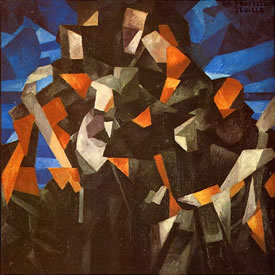
The Procession, Seville. 1912
PENSEES SANS LANGAGE (fragment)
aujourd’hui et depuis longtemps
les ruisseaux ressemblent à des petites femmes
une joie de vivre rêvant tout haut
ça ne signifie rien
pour regarder ailleurs
religions égoïstes de l’humanité
mon visage ressemble aux ruisseaux
mais personne ne viendra
almanach secret des grandes aventures
dans l’escalier
je ne vois rien
mes amis savent tout
feuilles publiques des potins
fabricants de génies et d’imbéciles
opération de toilette
monstres assis dans des fauteuils
illimités

Francis Picabia (22 januari 1879 – 30 november 1953)
De Belgische dichter, romanschrijver en psychoanalyticus Henry Bauchau werd geboren op 22 januari 1913 in Mechelen. Bauchau debuteerde pas op zijn 45ste in de letteren en publiceerde op zijn vijftigste zijn eerste roman. In de meeste van zijn boeken vermengt hij psycho-analyse, mythologie en verbeelding, waarbij vaak een innerlijke queeste centraal staat. Hij is sinds 1990 lid van de Académie royale de littérature de la Communauté française de Belgique (Koninkl
ijke Literaire Academie van de franstalige gemeenschap in België). In 2002 kreeg hij de Prix International Union Latine de Littératures Romanes en in 2008 de Franse Prix du Livre Inter voor zijn roman Le Boulevard péripherique. Zijn romans verschenen in diverse vertalingen, maar amper in het Nederlands
Uit: L’Enfant bleu
„Première année à l’hôpital de jour. Dès ma sortie du métro, à Richelieu-Drouot, je retrouve mon malaise. Je consulte ma montre. Après le long trajet depuis ma banlieue, je sais que je suis à l’heure et pourtant je me sens en retard. En retard sur le tumulte, l’urgence qui dominent ce quartier de la Bourse. En retard sur le monde, sur l’angoisse.
Je ne perds pas pied, je remonte lentement la rue Drouot , je me force à bien percevoir l’inégal échelonnement des gris et le dôme blanc de Montmartre qui les surmonte. Je suis présente, attentive, c’est le moment de changer de rue, d’aborder avec courage le porche un peu dégradé, l’escalier et l’écrasante banalité de l’entrée de l’hôpital de jour. Ensuite viennent le couloir, la salle des profs, ses tables, ses portemanteaux encombrés et l’accueil toujours méfiant de ceux qui m’ont demandé, le jour de mon arrivée, pourquoi on m’avait parachutée là.
J’ignorais alors les conflits qui troublaient la maison et j’ai répondu : « C’est la direction qui peut vous le dire, moi, je sais seulement que j’ai les qualifications nécessaires et que je dois gagner ma vie. » C’était peut-être la bonne réponse, depuis ils ne m’agressent plus, mais ils me tiennent à l’écart et je ne fais pas vraiment partie de l’équipe.
En arrivant je vois, affiché sur le mur par le professeur d’art, un dessin qui m’enchante et s’accorde à la détresse bien cachée que j’éprouve. C’est une très petite île, une île bleue, entourée de sable blond et couverte seulement de quelques palmiers. Cette île, son ciel, sa lumière, sa minuscule solitude protégée par une mer chaude expriment le désir, la douleur d’un cœur blessé. Le dessin naïf, d’une manière fruste, toute pénétrée de rêve, me fait sentir avec force le silence, l’exil terrifié, la scandaleuse espérance dont il est né.“

Henry Bauchau (Mechelen, 22 januari 1913)
De Britse schrijfster en actrice Mary Hayley Bell werd geboren op 22 januari 1911 in Shanghai, waar haar vader werkte in opdracht van de regering. Zij ontmoette er in de jaren dertig ook haar latere echtgenoot, de acteur John Mills. Als actrice speelde Mary Hayley Bell zelf in toneelstukken als ‘Vintage wine’ en ‘Victoria regina’. In 1942 trouwde ze met John Mills en stopte met spelen. Bell begon zich toe te leggen op schrijven van toneelstukken en boeken. Haar roman ‘Whistle down the wind’ werd verfilmd met in de hoofdrol haar oudste dochter, Hayley Mills. Later bewerkte Andrew Lloyd Webber het boek tot een musical. Ook schreef Bell een autobiografie, ‘What shall we do tomorrow?’, deze verscheen in 1968.
Uit: What Shall We Do Tomorrow?
„At Fernacres I started writing Angel -a play based on the Constance Kent murder in 1860. Binkie Beaumont said he would produce it, and Johnnie was to direct. On the day of the dress rehearsal, our Nanny gave in her notice; she wanted to become an air stewardess and had to catch the nine o’clock train! It was a nerve-racking morning, for Hayley, sitting thoughtfully upon her pot, wasn’t in a co-operative mood.
‘Do hurry up, Hayley! I urged.
‘Can’t! was all she would say, so we were not only late for rehearsal at the Strand Theatre, but we had to take the two girls with us. Bunch was happy enough playing about among the seats in the theatre and talking to herself, sometimes a little too loudly, but Hayley was a different matter. Too young to be interested for long, or able to sit still, I had to put her in charge of one of the lady character actresses in the cast, but during the morning I realized that the lady in question was now on the stage in a scene. I ran round to her dressing-room to collect Hayley, but there was no sign of her. No one had seen her! I asked the stage doorkeeper if he had seen what might have appeared to be a small dwarf, but he shook his head. She seemed to have disappeared and I was distraught with worry and fear. It was nearly an hour before she was discovered. She had walked straight out of the stage door and up the road to the next theatre, the Aldwych. Here she was found sitting on the lap of the stage doorkeeper, chatting away and having sardines levelled into her mouth on the end of a knife! No one, least of all Hayley, seemed in the least concerned.“

Mary Hayley Bell (22 januari 1911 – 1 december 2005)
Met haar echtegenoot John Mills
De Amerikaanse dichter, schrijver en criticus Howard Moss werd geboren op 22 januari 1922 in New York. Hij studeerde aan de University of Michigan. Van 1948 tot aan zijn dood was hij poëzieredacteur van The New Yorker magazine. Hij was de ontdekker van enkele vooraanstaande Amerikaanse dichters als Anne Sexton en Amy Clampitt. In 1971 won hij de Pulitzer Prize for Poetry en in 1972 ontving hij de National Book Award voor zijn Selected Poems.
The Hand
I have watched your fingers drum
Against each other: thumb against
The fore- and middle-finger. When
Tension leaves your hand alone,
Your face slides back its screen, I see
Such streams begin, such gardens grow
That you must hide more than you hide,
And I must know more than I know.
The Persistence of Song
Although it is not yet evening
The secretaries have changed their frocks
As if it were time for dancing,
And locked up in the scholars’ books
There is a kind of rejoicing,
There is a kind of singing
That even the dark stone canyon makes
As though all fountains were going
At once, and the color flowed from bricks
In one wild, lit upsurging.
What is the weather doing?
And who arrived on a scallop shell
With the smell of the sea this morning?
-Creating a small upheaval
High above the
scaffolding
By saying, “All will be well.
There is a kind of rejoicing.”
Is there a kind of rejoicing
In saying, “All will be well?”
High above the scaffolding,
Creating a small upheaval,
The smell of the sea this morning
Arrived on a scallop shell.
What was the weather doing
In one wild, lit upsurging?
At once, the color flowed from bricks
As though all fountains were going,
And even the dark stone canyon makes
Here a kind of singing,
And there a kind of rejoicing,
And locked up in the scholars’ books
There is a time for dancing
When the secretaries have changed their frocks,
And though it is not yet evening,
There is the persistence of song.

Howard Moss (22 januari 1922 – 16 september 1987)


